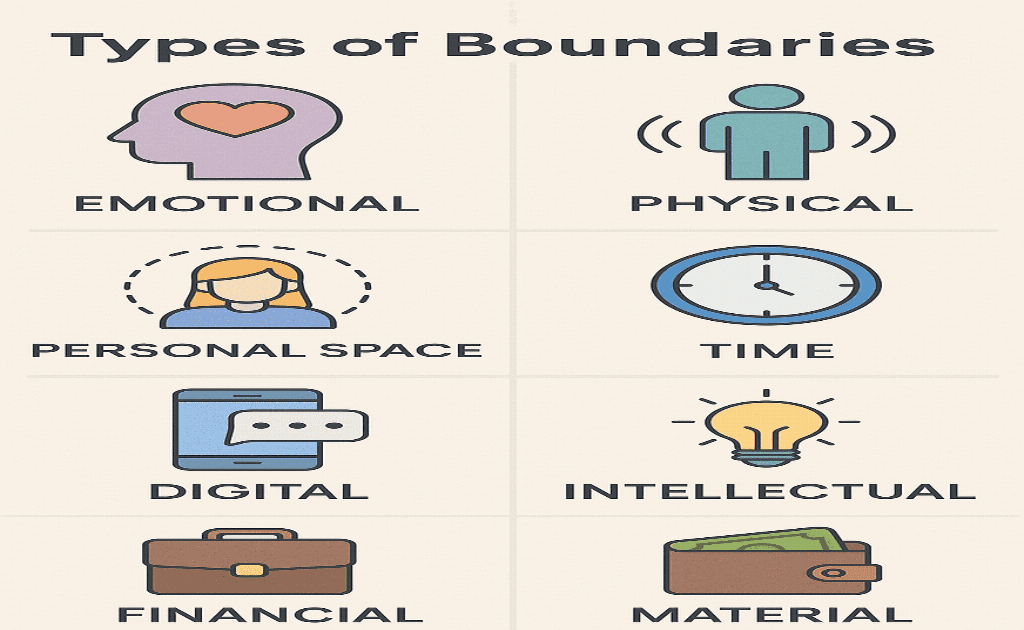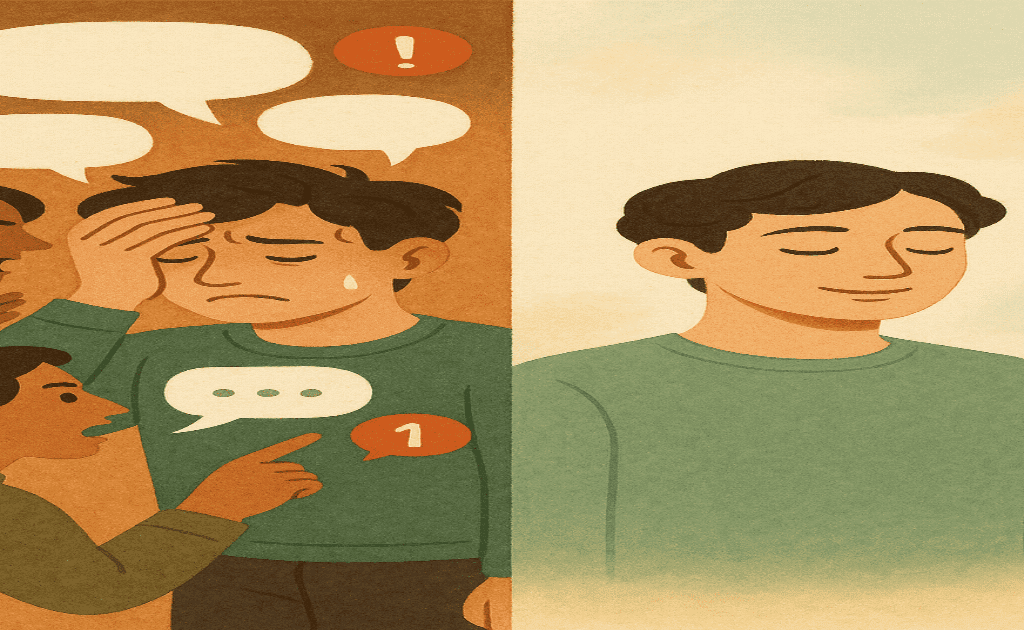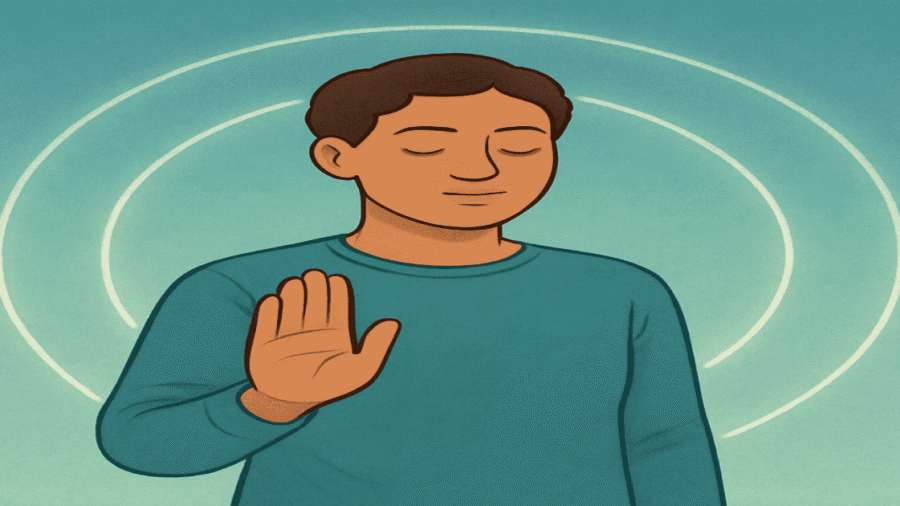Imagine leaving every family gathering or meeting with friends feeling completely emotionally drained. Almost like you have given them too much room for disrespect.
A friend calls you every evening, at their own time not to check in on you, but just to vent a frustration about something. They do not even care if you are awake, sleeping or even tired from a hectic day.
Sounds familiar right? These situations slowly drain your emotional energy, leaving you feeling overwhelmed, resentful, disrespected and even exhausted.
But the fact is that people do not know what you want, it is your responsibility to tell them and make it clear. This emphasises the importance of setting healthy boundaries, an essential component of maintaining mental wellness and respectful relationships.
In this post, we will explore the psychology behind personal boundaries, how to assertively set them with friends and family, and why it is a crucial act of self-care to respect your needs without guilt.
Understanding Boundaries
Boundaries are like the invisible lines you set between you and other people. These boundaries are set to protect your emotional, physical, and mental well-being and peace. They describe the manner in which you handle others and how you allow others to handle you.
Setting boundaries does to mean keeping people away they are about putting a clear limitation at where your comfort, values, and peace begin.
Just as you have a door with a knob to your house that you deem it fit when to open and close so should you have boundaries to your life.
Boundaries are personal, they change from one person to another. However, we have negotiable and nonnegotiable boundaries.
Negotiable boundaries are flexible but still important. They are boundaries you are willing to discuss, adapt, or compromise on depending on the situation or person. I do not like it when you call me late in the night, but I can make exceptions for close friends in crisis.
📝 Tip: Be clear when making exceptions. Otherwise, people may treat your flexibility as a lack of boundaries.
Non-Negotiable Boundaries: These are deal-breakers. They are not up for discussion and crossing them bring consequences. These protect your deepest values, mental health, safety, and integrity. Example: I do not accept any verbal abuse from people no matter how upset they are.
Types of Boundaries

- Emotional Boundaries: These boundaries are set to protect your feelings and emotional well-being regarding how people act towards you they talk to you. Example: I appreciate what you are saying but I do not appreciate your tone, I know you are angry, but I do not appreciate you unleashing that anger on me.
- Physical Boundaries: Relate to physical touch. Example: I do not consent to you touching me in that manner.
- Personal Space Boundaries: Relates to how you allow people into your personal space. Example: I will appreciate if you knock before entering my room next time.
- Time Boundaries: The manner in which people respect and make use of your time. Example: Do not call me after 10pm that’s my personal time.
- Intellectual Boundaries: Addressing how people respond to your thoughts and ideas. Example: I respect your opinion, but I see things differently and would prefer we agree to disagree.
- Material Boundaries: Control over your possessions. Example: I would prefer you inform me before wearing my stuffs of using my things.
- Digital Boundaries: Limits you set around your online presence, and what you are comfortable sharing or receiving on the digital spaces. Example: I have blocked some accounts that were affecting my mental health. I am building a healthier feed.
- Financial boundaries: Creating boundaries on the level of financial support you provide to friends or family. Example: I would have loved to support you, but I am not financially in the position to lend money right now. I hope you will understand.
Always use “I” when addressing your boundaries.
Why Boundaries?

- Preventing Burnout: By setting limits, you avoid overusing yourself at your own expense.
- Maintaining Self-Respect: Boundaries affirm your self-worth. They protect yourself from other people controlling you, using or disrespecting you.
- Fostering Healthy Relationships: They promote mutual respect and understanding.
- Enhancing Mental Health: Boundaries reduce stress and anxiety. Research indicates that clear boundaries can significantly reduce stress and improve overall well-being. Network Therapy
Signs You May Lack Healthy Boundaries
Understanding the signs of poor boundaries is the first step toward change. Common indicators include:
- Continuously saying “yes” when you want to say “no.”
- Feeling responsible for others’ emotions.
- Being unable to express your needs and feelings clearly.
- Allowing others to disrespect or manipulate you.
- Feeling guilty when you freely express yourself.
- Fear of being rejected.
How to Set Healthy Boundaries: A Step-by-Step Guide
1. Value and Honour Yourself
You cannot carry yourself anyhow and expect people to treat you differently. It is how you show yourself that people will respond to. It does not stop you from being playful or having fun but makes you a person of healthy principles.
Remember, People treat you the way you train them to.
Learn to put your needs first and not always succumbing to others at the expense of your own wellbeing. Before you can take care of others, you need to first take care of yourself.
2. Self-Reflection
Begin by identifying situations where you feel uncomfortable or resentful. We are all triggered by different things. When you know what triggers you, it just bounces off when next it comes and not make you unnecessarily angry. Ask yourself:
- What specific behaviours trigger these feelings?
- What are my needs in these situations?
Journaling can be a helpful tool in this process.
2. Clarify Your Needs and set Healthy Limits
Once you identify your boundaries and what triggers you, you need to speak it out. Clearly define what you are comfortable with and what you are not. Use “I” statements to express your needs and express them directly. Make statements like:
- “Mom, Dad, Aunty, I do not appreciate your constant complain about my marital status.
- “I feel financially burdened when you keep going on about me helping my siblings.”
3. Communicate your Feelings Clearly and Respectfully
Clarity saves relationship; express your boundaries assertively, clearly and simply without aggression. Learn how to say “No” politely without coming off as rude. Saying “No” to a request does not make you a bad person but shows you have a limit. In case saying “No” might feel bad, try and add a polite statement after saying a “No”.
- “I appreciate your concern, but I prefer to handle my relationship matters on my own terms.”
- “I understand you are upset, but I need some space to process this.”
- “I cannot make it to the party but I hope you have a nice time”
But do not try to over explain your reasons for setting your boundaries or saying no to someone. Over explanation can lead to unnecessarily debate and sometimes guilt tripping.
4. Enforce Boundaries Consistently
Consistency is key. If someone crosses a boundary, address it promptly. Reiterate your limits and the consequences of violating them. There should be consequences for breaking boundaries or else if someone breaks them and goes free, they will keep on doing so. If you keep picking up when they call you at ungodly hours, they will keep on doing so.
When you draw your line in the sand and people keep wiping it out, that is because the line was not deep enough
5. Invest in Yourself
Try and make sure you make a name for yourself, by investing in your personal growth. Build a career, develop your skills or establish a personal brand. Do not make yourself the go to person for everyone by being always idle or else people will disrespect you.
Ever heard a friend saying, as you “John” I can call him anytime he does not have anything doing?
Remember, the more you build your life, the less room you have for what breaks it.
6. Manage Guilt and Fear
It is normal to feel guilty when setting boundaries, especially if you are not used to it. Remind yourself that taking care of your needs is not selfish. Practice self-compassion and affirmations to reinforce this mindset.
7. Seek Support When Needed
If setting boundaries feels overwhelming, consider seeking support from a therapist or support group. They can provide guidance and encouragement as you navigate this process.
What to Expect After Setting Boundaries
Setting boundaries with loved ones can be particularly challenging. It can lead to various outcomes:
- Resistance: Some may react negatively initially. This is because they might not be used to these boundaries, people who get to take advantage of your tolerance will find your new form of assertiveness as rudeness and will try to resist.
- Guilt: You might feel guilty for setting some of these boundaries and some people can even make you feel guilty for setting boundaries to prevent them from doing what they like with you
- Improved Relationships: Over time, relationships can become more respectful, and people will value you.
- Increased Self-Esteem: As you honour your needs, your self-respect grows. People tend to understand you more and respect your feelings and needs.

Boundaries do not need to be fair; they demonstration of self-love, respect and are meant to protect you and your mental wellbeing
But as you are learning to set personal boundaries also remember to understand and respect other people’s boundaries as well. When you are at the receiving end of boundaries do not dismiss them but understand them with the same idea you used to set your own boundaries as well.
Do not create an ideal world where everything must be done according to your own terms and conditions, give room for people to grow around you. Listen to people when they overstep your boundaries and talk it through with them. The fact that you have set boundaries does not mean you should keep your walls up and be a loner, be flexible.



[…] aligns expectations and supports trust. You might find the tips in our post How to Set Healthy Boundaries with Family and Friends helpful for maintaining balance in these […]
[…] you struggle to set healthy boundaries or manage social anxiety, our article How to Set Healthy Boundaries with Family and Friends can help you use AI recommendations without losing personal […]
[…] How to Set Healthy Boundaries with Family and Friends – Offers psychology-backed tips to protect your mental space and reduce mental overwhelm. […]
[…] related article, How to Set Healthy Boundaries with Friends and Family, explores how unresolved guilt often manifests as poor boundaries and self-neglect. It provides […]
[…] familiar, you might also find it useful to learn How to Set Healthy Boundaries with Friends and Family, this post explores compassionate means of asserting yourself without feeling selfish or anxious. […]
[…] You can learn more about this in How to Set Healthy Boundaries with Family and Friends, where we explore how even small boundary. setting boundaries can give you […]
[…] How to Set Healthy Boundaries with Family and Friends, you will learn how quick, assertive boundary-setting can protect your mental energy and prevent […]
[…] not walls; they are doors to better mental health. You can explore this more deeply in our article How to Set Healthy with Family and Friends, which touches on self-worth and emotional […]